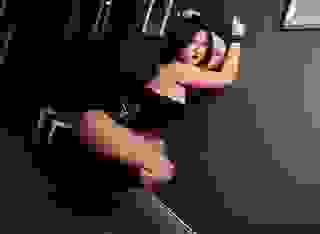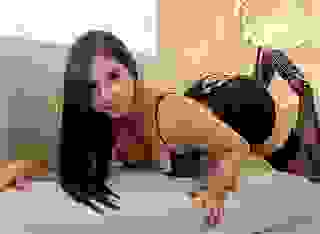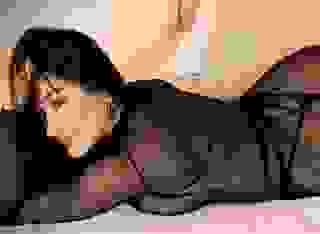- Novels and Novellas
- The Eighty-eighth Key Ch. 31
Note: You can change font size, font face, and turn on dark mode by clicking the "A" icon tab in the Story Info Box.
You can temporarily switch back to a Classic Literotica® experience during our ongoing public Beta testing. Please consider leaving feedback on issues you experience or suggest improvements.
Click here(Quick note: still in hospital though sitting up to write less burdensome, hopefully home later this week...)
Part IV
Chapter 31
____________________________________
Callahan came-to in a field of flowers, and he lay easily on a bed of tufted grass - watching bright puffy clouds drift by overhead on the cool breezes gently caressing his brow.
He heard music, familiar music, adrift on one passing current; he sat up at once, rubbing his eyes, looking for the music's source...but he only grew more confused. Across one of the fields beyond the softest breeze he saw a house, and while he knew the music had to be coming from there, this place he now found himself in felt utterly unreal...like music didn't belong here.
He stood, still confused, and he continued to feel that nothing about this place was real. First of all, the clouds overhead were white, true enough, but the color of the sky itself was pale yellow, and though the view was in a way calming, so too was it unsettling. And the clouds? He felt as if he could almost reach up and touch them. He looked down, saw the grass in the fields was pure white, the leafy trees surrounding the house the color of fresh cream...almost like an infrared photograph, he thought.
"What is this place?" Callahan whispered. "It's not real, whatever it is."
Yet even as he expressed skepticism the music on the breeze grew even more insistent.
Chords he'd never heard before took root inside the house across the field and blossomed into the sky, leaving traceries of gossamer cloud well beyond the moment their creation, weaving crystalline kaleidoscopes across the sky that seemed to coalesce around a certain feeling.
He stood and took a deep breath, feeling most-of-all that the air in this place was of shattering purity, and that sounds traveled with equal precision. He looked at these new, swirling clouds and felt the music, really felt emotive expressions within each new shimmer...
"How can this be?" he said to this surreal landscape.
"How could it possibly be otherwise?"
Callahan jumped at the sound of this new voice, yet in an instant he knew exactly who was speaking.
He turned and saw the Old Man in the Cape standing by his side.
"What are you doing here?" Callahan whispered.
"I thought that, perhaps, you could use a hand this evening."
"What do you mean? Why would I need your help?"
"First June, then An-Linh. Your mother, so suddenly? And now Sara? So much loss, so much pain. I really don't know how you've endured all of it. Or...have you?"
"What? What do you mean?"
"Have you endured? Any of it?"
"What are you saying?"
"I'm not so sure," the old man began, "that you've ever felt anything at all, not really. Maybe pain is just an abstract something you simply brush aside, like lint off your sleeve."
"Maybe you should get the fuck away from me while you still can."
And that made the old man laugh for a moment, yet then he produced his ornate cane and pointed to an emerging cloud. "Listen to it, Harry. I mean, really listen."
Callahan looked at the old man for a moment, then did as he asked.
And yes, there was something strange about the swirling chord. Standing here next to the old man the impression it left was fleeting - but hardly unambiguous.
"Loss," Callahan whispered. "Like a dirge."
The old man simply nodded as he flicked his cane, shifting to a minor key. "And now?"
Callahan's head tilted and his eyes closed. "Something deeper than loss. Something beyond."
The old man flicked his cane and a new stream of consciousness emerged within the music coming from the house.
"And now?"
Callahan tried in vain to feel the music within but the struggle left him desperate, winded. "I'm not sure," was all he managed to say.
"Try not to think of a specific feeling, Harald. Think more of a time you felt this structure."
"A time? What do you mean?"
"You do know that other senses evoke memory? Scent, for example, can revive a childhood memory?"
"Yes."
"Well...that's what I mean. Reach into the chord, Harald. Let the music carry you to the memory, to the moment of the memory's creation in your mind."
"The pines outside my window. The way they brushed the glass when a storm approached..."
"What else?"
"Mother. Downstairs, playing the piano."
"And what was she playing? Can you feel it?"
"It was almost always the same thing. She seemed to be playing to the approaching storm, like she was..."
"What, Harald? What was she trying to do?"
"It was like she was waiting for the storm to tell her something."
"What else?"
"Well, it was like she was summoning something from within..."
"From within...what, Harald? The storm?"
"I'm not sure."
The old man bent low over his cane and with sudden fury he flung another chord into the sky, and this time, when the full impact of the music hit, Callahan doubled over in crushing pain.
"Stand up, Harald."
"I can't," Callahan whispered. "What is that?" he added, grasping at the stars that filled his sight.
"What is - what?"
"So many stars..."
"Yes. Find the one calling to you now..."
"What?"
"Reach out, Harald. Reach out..."
He felt hands reaching up, reaching for something far, far away, then he felt other hands on his own, clasping and pulling, pulling him back into the light...
And when he opened his eyes he saw Colonel Goodman standing overhead, then Frank and Al by his side, helping him stand.
"Sara?" he asked. "Where is she?"
But all he could hear now was that last shattering chord, fading away slowly on a dying breeze, and beyond those last fleeting tendrils only the Old Man's voice remained...
"Find the star calling to you, Harald. Find her voice, now...while there is still time."
____________________________________
Didi Goodman was the first to reach Sara Callahan. She had seen the helicopter flying up the valley, flying far too low for a commercial transport, and training and instincts had kicked-in at that point. By the time she reached the clinic the helicopter was already departing the area, and when she ran inside only a few sleepy nurses were looking around, trying to figure out what had just happened...
But by then word was spreading fast: the big American girl had been seen running through the wards with a pistol raised by her face, and she hadn't been acting unbalanced - not at all.
Yet not one nurse thought to look-in or check-on Sara, even as Stacy Bennett made her way to the rooftop heliport...
...so it was Didi Goodman who found Sara. She found the body contorted on a blood-soaked hospital bed, the explosive head wound a massive wreck of shattered bone and brain; the immediate conclusion Didi reached was presumptive, but accurate, in its finality. Though Didi found a thready pulse, she took Sara's hand in her own, held her while she slipped away, held her until nurses and doctors arrived, then she called her contact in Tel Aviv and passed along all she knew.
___________________________________
In the aftermath, Callahan and the rest of the team had to admit that all their efforts had been compromised, and the conclusion reached was obvious: Stacy Bennett had been on the inside all along. Who had turned her, they wondered. Escobar? Someone in the Bureau? Even personnel within the San Francisco Police Department were considered, but in the end none of that mattered.
Captain Sam Bennett receded from view after this last betrayal, the verdict more than he could stand. Frank Bullitt returned to Israel to join Cathy, who seemed particularly wrung-out by the news of Sara's murder, and when she demanded that Frank quit the department he didn't argue. Al Bressler stuck close to Harry after the funeral in Davos, and rarely left his friend's side afterwards. Captain Jerome McKay disappeared soon after word of Stacy Bennett's betrayal reached the group, and though Goodman wouldn't say exactly where to, everyone assumed McKay made the trip east on the Israeli Jetstar - to a professional interrogation facility.
And this last effort turned the tide. Dozens of Escobar's deepest assets were uncovered and arrested, the Chalmers' dealer network was similarly laid bare and dismantled. Escobar reportedly gave up his ambitions on the west coast, concentrating on his operations in Florida, Louisiana, and New York, and though it was now assumed Stacy Bennett had been Escobar's asset from the beginning, she had completely disappeared from view. Neither the Mossad nor Interpol had the slightest bit of luck finding here, and within weeks all leads dried up.
_________________________________________
The team gathered at Avi's house in the compound after the funeral, but Goodman didn't bother with his usual debrief this time. The group was simply too disoriented now, too incapable of further introspection, too upset by Stacy Bennett's betrayal. And most of all, too rattled by the changes they had noted in Harry's behavior in Davos.
On their way to Davos the team had gathered protectively around Callahan - not simply to console him but to keep the outside world away - yet despite all that by the time they reached Davos, Callahan was little more than a trembling wreck.
When he slept, which he did too frequently now, he talked incessantly to someone on the far side of his dreams. Violent spasms followed, like he was wrestling demons in the night.
When he met Sara's parents at the funeral home he was tearfully guilt-ridden and unnervingly apologetic. When Callahan saw Sara's closed casket he fell to the floor, completely undone.
Didi Goodman, not surprisingly, moved in and assumed the role of protective Mother Superior at that point, taking Callahan to the house and virtually isolating him there. Only Al Bressler penetrated her sudden impenetrable veil, though Frank and Cathy tried to break-through - and more than once. Still, Didi asserted an unusually deep hold on Harry now, and Frank began to grow concerned.
After the funeral, the team, and Didi, returned to the compound, waiting for the premiere performance of Schwarzwald's Fourth Piano Concerto. Harry Callahan left the compound only once during those two weeks, to visit the Rosenthal Crypt - to talk with his mother, he said.
_______________________________________________
And the premiere turned out to be quite an event.
Because Imogen was still regarded as a native daughter, it seemed half of Denmark turned out for her last piece. Because of Saul and Avi Rosenthal's deep roots in Copenhagen, their memory, too, played a modest role in the huge Danish presence. Avi's stature in the Labor Party assured a huge Israeli contingent, and the simple fact that Herbert von Karajan was conducting the Berlin Philharmonic in Tel Aviv implied a sort of German apologia, which demanded an international presence of politicians and diplomats from Europe and the Americas.
The performance was startling.
The music seemed to carry the performers into deep emotional states, to possess the audience inside an almost otherworldly, trancelike state, and in the end all who came to the premiere agreed the concerto was one of the most significant works of the twentieth century. Deutsche Grammophon and TelArc had both recorded the performance and post-premiere sales were colossal; the Rosenthal Music Company of course had the publishing rights and sales were brisk. Symphony orchestras in San Francisco, New York, and Paris soon advertised their own performances.
And so, in the end, one Harry Francis Lloyd Callahan went from being a modestly wealthy young man to being positively filthy rich.
So, of course, he disappeared completely from view.
___________________________________________________
For the first few months of this second act in the Life and Times of Harry Callahan, he turned up in New Orleans. He played piano in a bar that catered to people who had chosen to live on the other side of life. He played Cole Porter songs for the most part, but Gershwin too from time to time. Men dressed like little girls nursed fruity five-o'clocktails while they watched Callahan play, while butched-up girls dressed like Bogart or Grant cruised the perimeters, looking for fresh meat hiding in the shadows.
There was a special kind of Hate for sale in the little bar just off Bourbon Street, too. Self-loathing cloaked behind veils of inward leaning pity, hiding in plain sight all the while, yet just beneath all those juxtaposed veneers a new currency emerged: patrons willing to sell their souls to whatever devil happened to be on hand. Anything to debase the moment, anyplace to explore the hidden depths of despair, yet no time for the moment.
Callahan watched new symphonies take shape around his piano night after night, and at one point he began to conjure new chords to paint the scenes around him. He began setting the scenes to music in the early morning, just after the bar closed, after he walked down to the Morning Call for thick chicory coffee and plates of powdered-sugar-covered beignets, where he put notes to paper for the first time in his life.
He'd rented a room off a splashy courtyard in Jackson Square, and most mornings, while he scribbled on his score, hookers came down for coffee before knocking off for the night. He was soon a part of their landscape and, without knowing the how or the why of such things, he wasn't too surprised when a couple of girls started sitting next to him. One of the girls stopped by one night and started their first conversation:
"What are you writing? A book?" she asked that morning.
"Music," Callahan sighed.
"What kind?"
He shrugged: "A symphony, I guess."
"You mean, like with strings and all that stuff?"
"Yup, all that stuff."
"You sure are writing a lot."
Callahan nodded before he picked up another beignet, the slightest breath from his nostrils causing a blizzard of powdery-sugared chaos to drift across the pages on the table.
"You got to be careful with those things," she said, grinning.
"Want one?" he asked as he picked up his cup of coffee.
"Sure."
"Help yourself." And he watched her as she ate. A farm girl, he guessed, mean father, rebellious spirit, run off from her home by a vindictive mother...he could see it all as he watched the girl. She wasn't ugly - far from it - but she was damaged goods. Broken. A broken girl living a broken life.
"You live around here?" she asked.
"Renting a room," Callahan said, pointing to the square, "over there."
"Got anyone?"
"Anyone?"
"You married, someone like that?"
He looked away. "Not anymore."
"Oh? Divorced?"
He looked up, looked at the ceiling fans turning lazily overhead. "No, not divorced."
"Oh," the girl said, "I'm sorry. Ya know, I was tellin' my friend you look kinda sad. Like somethin' real bad just happened to ya."
He looked at her, but didn't say a word."
"Look, I didn't mean to bother you..."
"You're not bothering me."
"Well," she said, standing up abruptly, "thanks for the donut. Maybe, uh, I'll see you around."
Callahan nodded. "Yeah. Maybe." He watched her go, not at all sure what he felt, not at all sure what Sara's passing had done to him. Or...what it was doing to him...
He walked across the square to his room, passing a little fountain just outside his door, and he stopped now and looked down into the black water, watching his reflection as it morphed and rejoined over and over again.
He swallowed hard and blinked back a tear, walked to his door and opened it.
It was a glorified hotel room, nothing more, nothing less, but the quality of the decor was, maybe, just a little upscale for a hotel. He went to a cupboard and found a bottle of bourbon and poured two fingers, then loosened his tie and slipped out of his shoes. He sat on the sofa and looked through the thick plantation shutters as light came back to the city, and a few minutes later he was asleep...
...and back on the mountain in Davos, waiting for the Old Man in the Cape...
_______________________________________
The same girl was walking with her friends when she saw him walking on Bourbon Street the next night, and she followed him until he disappeared into one of those seedy underground places the real weirdos hung out in. She couldn't decide what to do, either. Follow him, or just blow it off...this feeling she'd had all day.
The bar was in an obscure little alley off St Anne Street, between Bourbon and Royal, and the peeling front looked like it had been painted with old mustard. The entry was cleverly disguised as a 'front porch', the door suffused with the putrid glow of black lights mounted somewhere within the warped ceiling. There was only a small sign denoting the place, a large, rusted piece of flat iron that had had the word Dungeon cut into it with a welding torch.
"I don't think this place is safe," the girl's friend said.
"How do you know?"
"My parents told me. This place has a bad reputation."
"For what?"
"I don't know."
Yes, the Dungeon had an unearned reputation, but mainly because all the local "pervs" came to the place. The social outcasts and the druggies with the 'golden arms' hung out in the shadows here, the latter dealing horse and hash in equal measure, while trannies and burnt-out socialites huddled by the bar and, as soon as Callahan arrived, the little tables clustered around the piano. The air seemed purple to the girl as she made her way in, and her nose wrinkled as scents ranging from patchouli and sandalwood, and the less noticeable shades of heroin melted in spoons, wafted by.
She went to the bar and ordered a Coke, then she settled-in and watched this bizarre parade of humanity roll by. The first thing she noticed was that life inside this haven had split into the times before and after this strange musician started playing, because as he approached the piano a gentle hush fell over the room; after he began playing she felt a sigh of relief roll around the room like a purple haze.
And she knew that first song, too. He played Cole Porter's, surely the patron saint of decadent parties, 'I've Got You Under My Skin,' which must've made the heroin dealers smile. But now she watched him, watched the way he played, and she felt mesmerized as she watched the interplay of his music within the room. His eyes closed some of the time and never on the keyboard, he was a virtuoso, some kind of savant, the music drifting seamlessly between jazz classics for one set, then hitting such Beatles standards as Lady Madonna and Yellow Submarine. If a regular asked him to play something he did so with a nod and a smile, and the huge brandy snifter on top of the piano filled with dollar bills as the night went on.
Every now and then he took a break, went up to the bar and picked up a club soda with a slice of lime, and she hid from him the first time he did so, watched how people came up and thanked him. Then she picked up an errant thread of conversation; this guy had just showed up one night and started playing. No one paid him, no one knew his name. Business picked up, regulars started coming by almost every night instead of once a week or so, and the owners even asked the stranger if they could pay him. The rumor was, or so she heard, was that he'd declined. More interesting still, she heard his tips on the piano were split between the cocktail waitresses.
Which, for some reason, she didn't find all that strange. Not for this guy, anyway.
Some time after midnight a glamorously attired platinum blond materialized, a semi-retired movie star now living in the quarter, accompanied by a few too-masculine hangers-on in her large retinue, and she moved through the bar like an ice-breaker, pushing aside the riff-raff on her way to a table by the stranger on the piano.
He looked up once and finished what he was playing, then got up and walked out of the bar.








